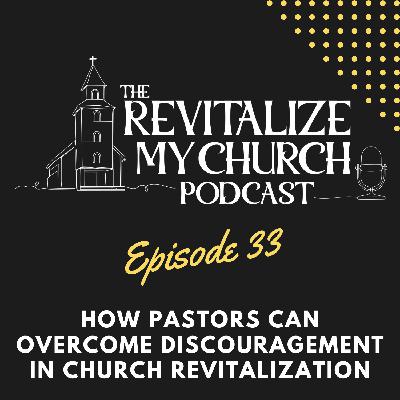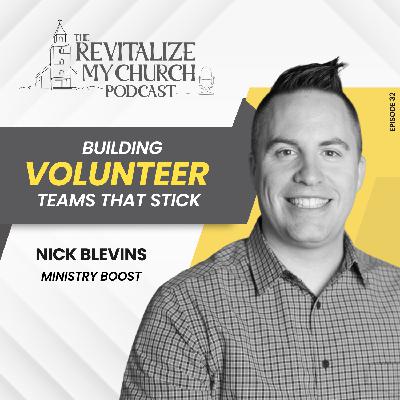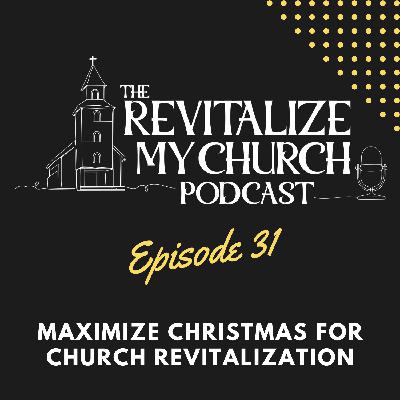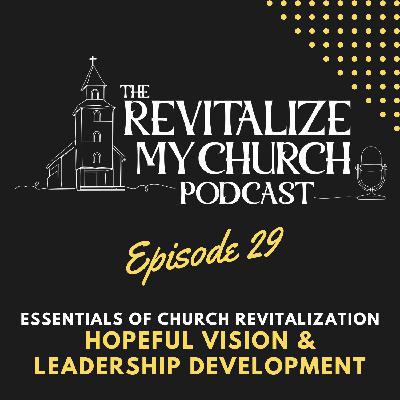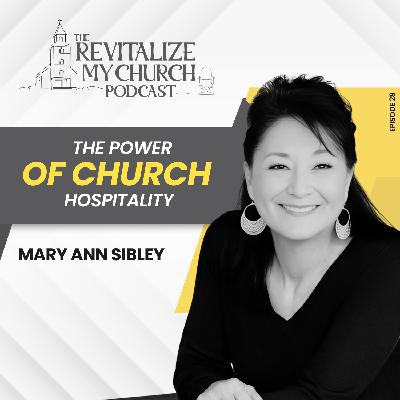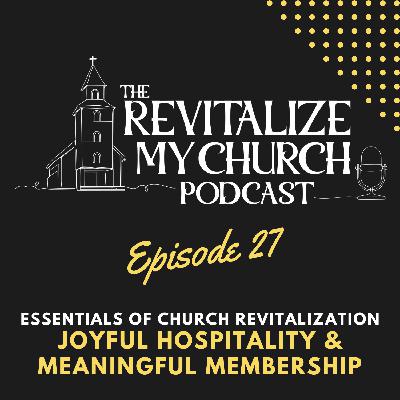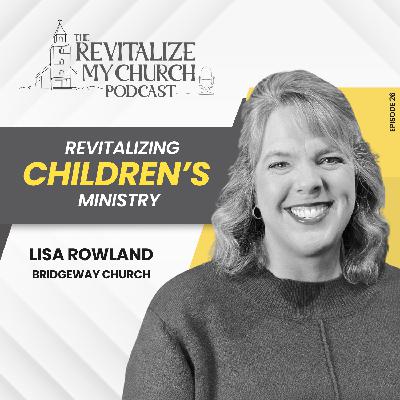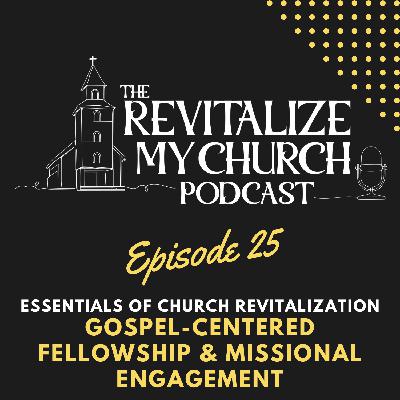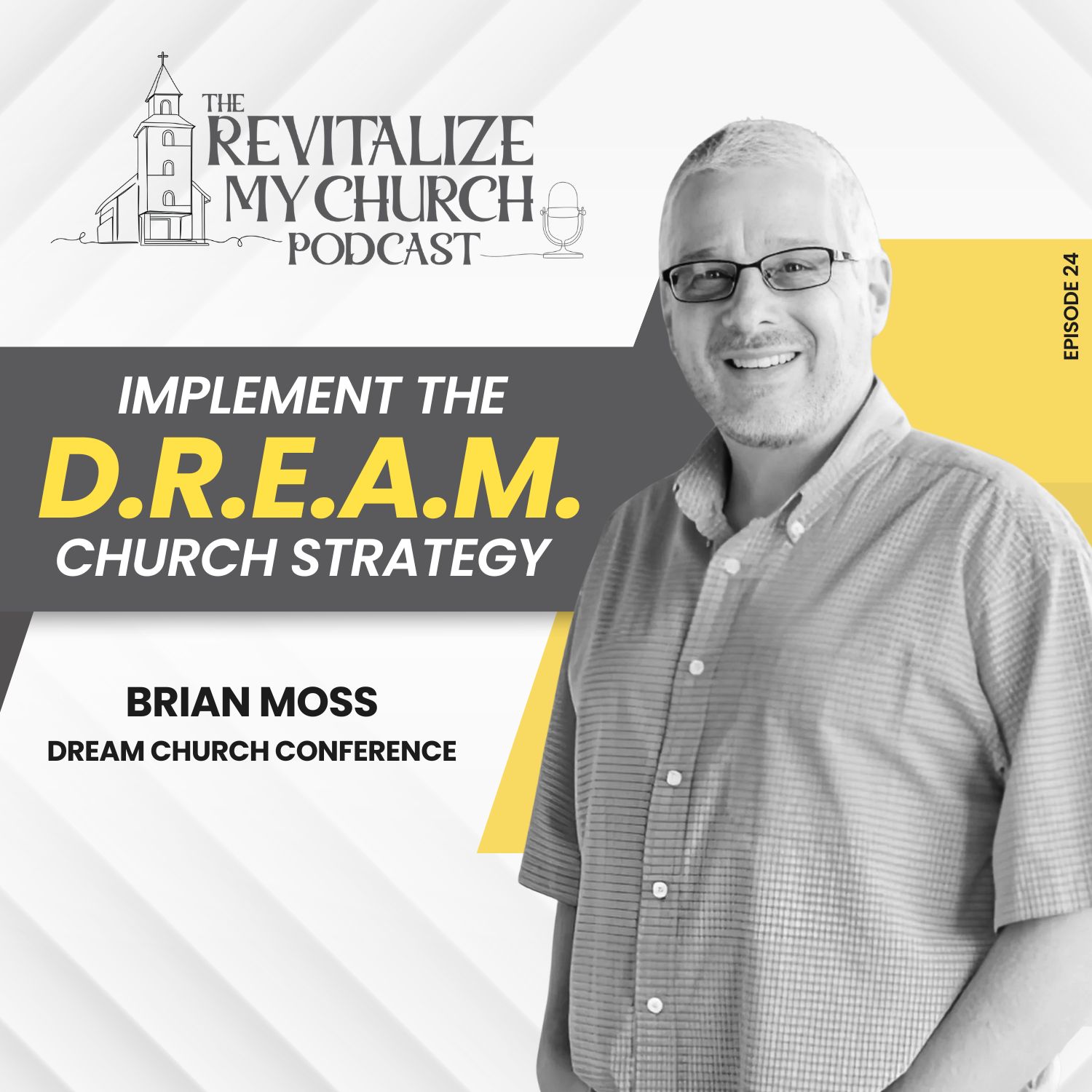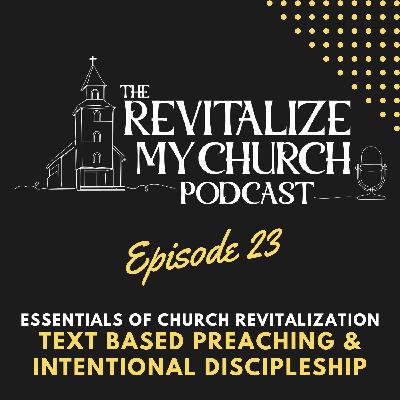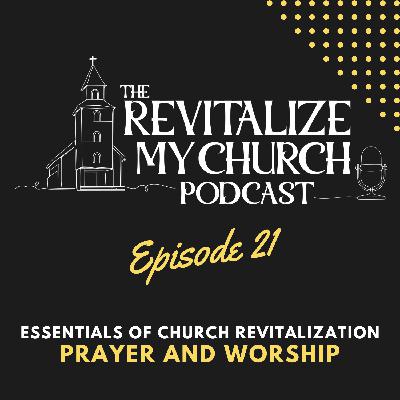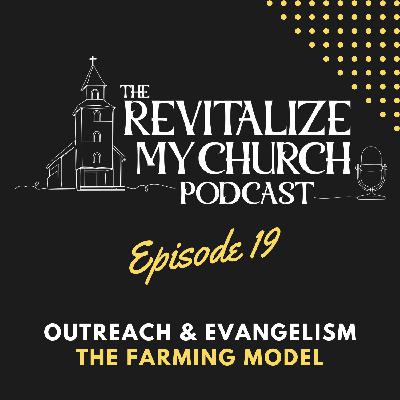Discover Revitalize My Church
Revitalize My Church

Revitalize My Church
Author: Assist Church Expansion
Subscribed: 2Played: 128Subscribe
Share
© 2024
Description
Hosted by Bart Blair and Nathan Bryant, two respected coaches in the field of church renewal, the Revitalize My Church podcast provides real-world advice and encouragement in each episode. In addition to insights provided by Bart and Nathan, you’ll also hear interviews with pastors and church leaders who have personally been involved in a successful church turnaround. They discuss the revitalization journey, keys to renewal, and lessons learned.
40 Episodes
Reverse
Episode 38: Show Notes
Building a sustainable discipleship culture that transforms hearts, not just minds
TLDR (The Quick Takeaway)
Identify your four types of people: Categorize your congregation into sleepers (spiritually asleep), seekers (genuinely open), consumers (service-focused), and disciples (committed followers)—and focus your energy strategically on each group rather than trying to be everything to everyone.
Simplify to transform: Stop adding more programs. Instead, focus on creating a discipleship culture through spiritual disciplines like reflection, gratitude, and confession that actually change hearts and behavior, not just knowledge.
Lead from your own renewal: Pastors experiencing burnout should prioritize their own spiritual formation and daily gratitude first—this "rewires" your soul and naturally makes your church healthier and more missional.
Build a scalable discipleship pathway: Multi-campus churches can maintain their DNA while reaching diverse communities by being intentional about discipleship at every level, from sleepers to mature disciples.
Episode Summary
Pastor Daniel Im sits down with Bart Blair to discuss one of the most critical challenges facing church leaders today: how to disciple people in a way that actually transforms their lives and faith practices, not just fills their heads with Bible knowledge.
In this conversation, Daniel shares lessons from leading a 104-year-old multi-ethnic, multi-campus church in post-Christian Canada, and discusses his latest book, The Discipleship Opportunity: Leading a Great-Commission Church in a Post-Everything World. If you're a pastor feeling burned out, questioning your approach, or wondering how to reach and disciple people differently in today's culture, this episode is for you.
What You'll Learn
How to move beyond programs and create actual spiritual transformation in your congregation
Daniel challenges the church growth mentality that prioritizes attendance and buildings over genuine discipleship. He explains why many churches create "Christian consumers" instead of committed disciples, and what a healthier framework looks like.
The four categories of people in your church and how to reach them strategically
Daniel introduces the "quadrant" of people every church has: sleepers (spiritually asleep members), seekers (genuinely open to faith), consumers (who view church as a service to attend), and disciples (committed followers). Understanding these categories changes everything about your approach.
Why pastors should focus on gratitude and spiritual formation before trying to grow their church
Rather than chasing larger numbers, Daniel shares a surprising insight: when pastors focus on daily gratitude, spiritual disciplines, and their own transformation, the church naturally becomes healthier and more missional.
Practical discipleship strategies that work in both small and large churches
From his experience at Beulah Alliance Church (now multi-campus with 12,000+ attendees), Daniel shares how to build a discipleship culture that scales without losing its DNA.
The role of neuroplasticity and spiritual practices in forming Christlikeness
Daniel shares fascinating insights about how our brains actually change when we practice spiritual disciplines like reflection, meditation, and confession—and why this matters for church leaders trying to help people grow.
Key Quotes from the Episode
"My heart and my desire for you is that just like I pray every week, God, would you wake up the sleepers, the seekers, the consumers, and the disciples."
"It's so easy to just...
Episode 37: Show Notes
Hosts: Bart Blair (Director of Church Revitalization, Assist Church Expansion) & Nathan Bryant (Executive Director, Assist)
Episode Summary
In this episode, Bart and Nathan discuss five common obstacles that derail church revitalization efforts. Based on years of experience coaching churches through renewal and replanting, they identify specific failure points and provide practical solutions to help church leaders navigate change more effectively. This episode is designed to help church leaders position their churches for success in 2026 and beyond.
TLDR: 5 Critical Mistakes That Sink Church Revitalization
• Overestimated Readiness: Churches think they're ready for change but haven't prepared their congregation or identified cultural barriers—use health and readiness assessments before launching revitalization.
• Unrealistic Growth Expectations: Expecting to reach younger demographics without addressing cultural dissonance—conduct a demographic study and focus on reaching the lost, not just targeting an age group.
• Poor Leadership Pacing: Leaders often move too fast without relational capital or too slowly without momentum—get a coach and build a strategic vision team to maintain accountability.
• Complicated Decision-Making: Consensus-based governance on every decision creates red tape that prevents progress—delineate staff, board, and congregational decisions and simplify your structure.
• Unprepared for Conflict: Most churches are reactive rather than proactive in conflict management—implement Biblical conflict training before crisis hits and address issues early using Matthew 18 principles.
Why Churches Overestimate Their Readiness for Revitalization Efforts
Key Points:
• Hearts say "yes" to change, but heads aren't prepared to follow
• Churches are unclear about how much change is actually necessary
• They're looking for a "silver bullet" rather than understanding systemic cultural change
• Congregants have conflated practices with theology—they believe cultural expressions are biblical mandates
• Small changes (like removing a painting or changing wall colors) can create unexpected resistance
Solution:
• Conduct a Health Assessment and Readiness Assessment before beginning revitalization
• Use the "Praying for Renewal in Our Church" 40-day prayer guide to prepare the congregation spiritually
• Download the Health Assessment at RevitalizeMyChurch.com
• Spend time nurturing relationships and moving people toward readiness rather than rushing into change
How to Help Aging Churches Attract Younger Families Without Unrealistic Expectations
Key Points:
• Churches have lost younger generations due to cultural dissonance between the church's identity and contemporary culture
• The church's identity is often frozen at its "peak"—whatever cultural expression existed when the church was most vibrant becomes permanent
• Young people feel they're "time traveling" when they enter the sanctuary
• Young adults seek churches where they can bring friends and feel culturally at home
• Focus should be on reaching the lost, not necessarily on achieving a specific age demographic
Solution:
• Conduct a demographic community study to understand who lives in your area
• Ask and answer: "Who are we most likely to reach given our location and community connections?"
• Don't assume that hiring a young pastor automatically attracts young families
• Recognize that...
How Churches Can Find New Life Through a Strategic Merger
Podcast Show Notes with Jim Tomberlin
TLDR: 4 Key Takeaways
Church mergers are no longer a last resort – They've evolved from a "survival tactic" to a legitimate growth strategy, with 40%+ of multi-site churches now acquiring campuses through mergers rather than church plants alone.
Focus on mission, not just survival – The most successful mergers happen when churches prioritize reaching their community and making disciples over simply preserving a building or institution.
One church leads, one follows – A successful merger requires clear leadership dynamics (not a 50/50 partnership). Health and trajectory matter more than size or wealth when determining the lead church.
Control is the biggest merger killer – More mergers fail due to pastors, board members, or donors unwilling to relinquish control than any other factor. Humility and kingdom-mindedness are essential.
How to Tell If Your Church Is a Good Candidate for a Strategic Merger
Jim Tomberlin breaks down the three categories of churches in America: about 20% are strong, 60% are stuck, and 20% are struggling. If your congregation falls into the stuck or struggling category, a merger might be the second chapter your church needs. Learn how to assess whether your church has the health and openness required to pursue a merger successfully.
What the Latest Statistics Show About Declining Churches and Merger Trends
Over 300,000 Protestant churches exist in the United States, but the landscape is shifting rapidly. Discover the current state of American churches, why approximately 100,000 church facilities could be repurposed or sold by 2030, and how mergers present an alternative to closure. This section reveals the data-driven reasons why church leadership conferences and denominational leaders are now taking mergers seriously.
Why Language Matters When Discussing Church Mergers With Your Congregation
The word "merger" carries negative baggage from the business world. Explore alternative language—restart, replant, partnership, adoption, collaboration, and consolidation—and learn why reframing the conversation can help your congregation embrace the possibility of joining with another healthy church. This is critical when communicating with your church members and moving toward a congregational vote.
How Multi-Site Church Models Are Changing Church Merger Conversations
The multi-site church movement fundamentally transformed how mergers work. Instead of the old "win-lose" merger outcomes (where one church absorbed another and both declined), today's mergers create "win-win-win" scenarios. Learn Jim Tomberlin's firsthand story from Willow Creek Community Church in Chicago and how it launched a 3,000-person campus through a strategic merger.
The Dance of Leadership: Making Church Mergers Work When Personalities Clash
Two churches can't have two leaders. This section explores the critical "dance" metaphor—understanding who leads and who follows in a merger conversation—and why it's not about size or wealth, but about health and trajectory. Discover the three foundational questions every merging church must answer: Is it possible? Is it feasible? Is it desirable?
Merging for Mission vs. Merging for Survival: The Critical Difference
Many struggling churches approach mergers from a place of desperation. But Jim Tomberlin explains why the most thriving post-merger churches shift their mindset from "how do we survive?" to "how do we reach our community?" This requires churches to let go of 1950s ministry models and embrace a "future-ready church" mentality that meets people where they are in 2025 and beyond.
25 Issues Every Church Merger Must Work Through (And Which Ones Are Deal-Breakers)
Church mergers aren't simple. Tomberlin and his team have identified 25 distinct issues that every...
Episode Summary
Bart Blair shares five essential books to help church leaders grow in their ministry and guide their churches toward greater health and vitality in 2026. Whether you're in revitalization, replanting, or simply seeking to lead more effectively, these books offer practical wisdom and biblical foundations for lasting change.
Subscribe & Listen to the Revitalize My Church Podcast
• Available on Apple Podcasts, Spotify, and all major podcast platforms
• New episodes release on the 1st and 15th of each month
Book 1: The Discipleship Opportunity
Author: Daniel Im
Lead Pastor at Beulah Baptist Church in Edmonton, Alberta
Subtitle: How Churches Can Equip the Saints to Do the Work of Ministry
Key Takeaway
Every church has discipleship-related systems (classes, programs, models), but not all have an integrated discipleship pathway where systems work together to move people toward spiritual maturity.
Featured Quote
"I have found that every church has discipleship-related systems, but not every church has a discipleship pathway. Essentially, any sort of class, model, or program can be seen as a discipleship-related system. However, it's only when all these systems are working together in an interconnected fashion (instead of working in isolation) that you get a discipleship pathway—a system of systems."
Why This Book Matters
• Moves beyond theory to practical systems
• Helps integrate disconnected programs into a cohesive pathway
• Based on real-world church implementation
Book 2: The Strategically Small Church
Author: Brandon J. O'Brien
Subtitle: Intimate, Nimble, Authentic, and Influential
Key Takeaway
Small churches have unique strengths—intimacy, agility, and authenticity—that should be leveraged as advantages rather than viewed as limitations to overcome.
Featured Quote
"A strategically small church is not a large church that hasn't grown yet. It's a church that has intentionally chosen its size because it believes that's the best way to accomplish its mission in its community."
Why This Book Matters
• Challenges the "bigger is better" mentality
• Gives permission to churches to define success on their own terms
• Helpful for replants and churches seeking to find their identity
Book 3: 8 to 15
Author: Tom Mercer
Subtitle: The World Is Smaller Than You Think
Key Concept: The Oikos
The ancient Greek word "oikos" refers to your natural network of relationships—family, friends, neighbors, coworkers, and acquaintances. God has already placed 8-15 of these people in your everyday world as your primary mission field.
Key Takeaway
Most people come to faith through close relational influence, not programs or events. Share Christ naturally over time with the people God has already placed in your life.
Practical Steps
• Pray for these 8-15 people by name
• Build intentional relationships
• Share Christ naturally
Why This Book Matters
• Equips every believer (not just pastors) to be an evangelist
• Shifts focus from programs to personal relationships
• Multiplies evangelism and disciple-making through natural ne...
Creating Space for Every Child in Your Church. In this powerful episode, host Bart Blair, Director of Church Revitalization for Assist Church Expansion, sits down with seasoned occupational therapist Amanda Perches to unpack practical and affordable ways every church—no matter the size—can become a welcoming space for children with special needs and their families.
Are you a church leader, pastor, or ministry volunteer hoping your congregation can better serve families affected by autism, ADHD, sensory processing differences, or other neurodiversities? Are you searching for real, tried-and-true methods to establish special needs ministry, start a sensory room, and foster a culture of inclusion in your faith community? This is the episode for you!
Key Topics Covered:- How Amanda’s 25+ years as an occupational therapist shaped her perspective on church ministry for families with special needs.- Powerful statistics about the prevalence of special needs in communities—and the essential role churches can fill (did you know that as many as 1 in 5 families have a child with special needs?).- Why small churches are naturally suited for effective special needs outreach—sometimes even better than large churches!- Busting the myth that creating “special needs spaces” or “sensory rooms” is expensive, complicated, or requires huge renovations.- Step-by-step guidance on **how to set up a special needs-friendly environment** for neurodiverse children, including practical lighting, seating, sound, and visual strategies.- The most important “non-negotiables” for a basic sensory room every church can afford to implement.- The critical importance of including parents, siblings, and teenage volunteers in church special needs ministry.- Serving not just the child, but the whole family: why support and community for parents and siblings changes everything.- How to communicate your new special needs ministry to the public with authenticity while avoiding common missteps. Real-World Takeaways for Churches:- Tips for assessing and repurposing the spaces you already have — no major construction required!- Budget-friendly equipment and furnishings that support sensory needs, focus, and calm.- Why listening first and collaborating with families is the foundational key to launching a meaningful ministry.- How teens can transform their own lives and perspectives by volunteering with special needs children—even fulfilling their service hour requirements!
Whether you’re looking to attract young families from your neighborhood or simply want to serve differently-abled members of your congregation, you’ll find practical advice, encouragement, and inspiration in this episode.
Listen in and learn:- How to approach outreach to families with special needs- What questions to ask when designing your church spaces- Ideas for flexible seating, fidgets, weighted blankets, quiet spaces, and more- Encouragement for small and mid-sized churches—you can make a huge difference!- Where to get professional help (and why consulting with occupational therapists matters)
Don’t forget to subscribe for fresh episodes on the 1st and 15th of every month with new guests, actionable conversations, and practical church renewal strategies. If this episode helped you, please LIKE, SHARE, and COMMENT with your own experiences or questions about special needs ministry!
Resources & Links:- Visit our website for articles, eBooks, and free assessment tools: https://www.revitalizemy.church/- Listen to past episodes on church revitalization, hospitality, leadership, and more!
#SpecialNeedsMinistry #ChurchRevitalization #InclusiveChurch #ChildrenWithAutism #ADHD #SensoryRoom #FamilyMinistry #ChurchLeadership #BartBlair #AmandaPerches #ChurchPodcast #Neurodiversity #AssistChurchExpansion
Is ministry burnout and discouragement draining your passion for church revitalization? In this episode, Bart Blair and Nathan Bryant share five biblical and practical steps to help pastors overcome discouragement, regain momentum, and enter 2026 with renewed fire for ministry.
Episode 33 of the Revitalize My Church Podcast explores:
Step 1: Look to Jesus for Restoration — Understand that your identity as God's child matters more than your ministry performance. God loves you unconditionally, not because of what you accomplish. Learn how to lean into your calling with confidence in God's provision, not your own abilities.
Step 2: Look Back on What God Has Already Done — High-achieving pastors often skip celebration to move to the next goal. Discover why celebrating small wins—spiritual growth, restored marriages, baptisms, and the simple fact that your church is still alive—is critical for combating discouragement.
Step 3: Check the Eternal Scoreboard — Stop measuring ministry success only by numbers. Understand that one person coming to Christ has eternal consequences that far exceed any attendance metric. Fix your eyes on what is unseen, not on visible metrics.
Step 4: Share the Load Through Delegation — Most pastors are doing too much and carrying unsustainable responsibility. Create a practical inventory of your tasks, identify what only you can do, and delegate the rest. Discover how delegation connects others to their calling and prevents pastoral burnout.
Step 5: Rest and Care for Your Soul — Jesus modeled regular withdrawal for prayer and restoration. Learn how to implement a monthly (or weekly) personal retreat day. Nathan shares his powerful practice of using a notebook to brain-dump burdens, clearing mental space for genuine encounter with God.
Bonus: Build Peer Accountability — Every pastor needs another pastor who understands the weight of ministry. Learn how to find and nurture a peer mentor relationship that provides encouragement, prayer, and authentic community.
This episode includes real-world examples, like how pastor Jerry faced unexpected resistance to simply repainting his church sanctuary, and Bart's golden accountability relationship with pastor Bob Church in Alberta. Whether you're in a small church plant or established congregation, whether you're struggling with unmet goals, resistance to change, or pure exhaustion, this conversation offers hope and actionable steps to reclaim your joy in ministry.
If you're tired, discouraged, or questioning your calling as a pastor in church revitalization, this episode will remind you of your true identity in Christ and provide the practical tools to sustain healthy, joyful ministry.
For more resources on church revitalization, pastor burnout, and leadership development, visit RevitalizeMyChurch.com or connect with Assist Church Expansion.
Subscribe to the Revitalize My Church podcast for episodes on church growth strategies, overcoming resistance to change, community outreach, and pastoral health. New episodes release on the 1st and 15th of every month.
#ChurchRevitalization #PastorBurnout #MinistryDiscouragement #ChurchLeadership #PastoralCare #SmallChurchMinistry #ChurchGrowth #PastoralWellness #ChristianLeadership #LocalChurch
The Five-Step Church Volunteer Recruitment Framework That Actually Works
Why Traditional Church Volunteer Recruitment Methods Fail
Most churches rely on ineffective methods like stage announcements, program inserts, and mass emails. These approaches typically result in low commitment rates, with many volunteers saying yes but never following through. Nick's framework addresses this by creating a systematic process that treats volunteer recruitment like a well-designed pathway rather than random requests.
Step 1: Prospects - Building Your Church Volunteer Contact List
Do you have enough prospects in your pool? Think of names on a list to talk to in order to get the number of volunteers you need. This is the foundation - having specific people identified rather than making general appeals.
Step 2: Conversation - Initiating Meaningful Volunteer Discussions
If someone is a name on your list and you don't know them well, you need to get into a conversation with them. This might start over email, text, or in the lobby, but the goal is moving from prospect to actual dialogue about serving.
Step 3: Orientation - Helping Prospects Understand the Ministry Vision
Getting them into orientation, which Nick approaches differently than most churches. This is where prospects learn about the ministry's purpose and impact.
Step 4: Onboarding - The Critical Process Where Churches Lose People
This is where many churches lose volunteers even after they say yes. The onboarding process includes several sub-phases:
Observation Phase: Letting prospects see the ministry in action
Thorough Vetting: Applications, background checks, interviews
Intentional Apprenticeship: Serving alongside experienced volunteers with checklists
Follow-up and Placement: Six-week check-ins to ensure success
Step 5: Placed - Successfully Serving in Their Ministry Role
The volunteer is now actively serving in their assigned role with proper support and ongoing development.
Six-Week Follow-Up Strategy for Church Volunteer Retention
Retention depends heavily on early follow-up. At the six-week mark, ministry leaders should meet with new volunteers to discuss:
What aspects of the role energize them
What drains or frustrates them
Process improvements from a fresh perspective
Potential role adjustments if needed
FEMA Nonprofit Security Grant Program: Up to $200,000 for Church Security
What Churches Can Purchase with FEMA Security Grant Money
The Nonprofit Security Grant Program provides up to $200,000 per physical address for facility hardening, including:
Security cameras and monitoring systems
Door access control and key card entry
Alarms and emergency alert systems
Fencing and bollards for vehicle barriers
Blast-resistant glass and window coverings
Security training (up to 5% of total grant)
Church Security Grant Application Success Rates and Timeline
Approximately 50% of organizations that apply receive funding, but success rates are much higher for properly prepared applications. Churches working with experienced consultants see success rates around 95% when applying consistently over 2-3 years.
The grant typically opens in May-June annually, with state-specific deadlines varying based on federal budget timing.
How Small Churches Can Benefit from Federal Security Grants
Even churches with limited budgets can effectively utilize the full $200,000 grant amount. Security upgrades often cost more than expected, and the improvements provide both enhanced sa...
How to Leverage Christmas for Church Revitalization | Church Growth Strategies
In this essential episode for church leaders, Bart Blair and Nathan Bryant share proven Christmas outreach strategies that can revitalize your church and attract new visitors during the most opportune season of the year.
Did you know that 60-70% of Americans attend a Christmas church service annually? Learn how to maximize this incredible opportunity for church growth and community engagement with practical, budget-friendly ideas that work for churches of any size.
WHAT YOU'LL LEARN:
Why Christmas outperforms Easter for visitor attendance
The 3-step framework for successful Christmas outreach
How to train your congregation to invite effectively
Creative alternatives to traditional Christmas services
Critical follow-up strategies to keep visitors coming back
Real examples from church plants and revitalizing churches
How to plan impactful events with just $200 and 25 people
THE THREE CRITICAL COMPONENTS FOR SUCCESS:
Planning Your Event Start planning now - early November is not too early. Consider what your church can authentically do well rather than copying other churches. Use AI tools like ChatGPT to brainstorm creative ideas within your budget.
Mobilizing Your Congregation Train your people on how to invite effectively. Personal invitations during Christmas have the highest acceptance rate of any time during the year. Create multiple touchpoints throughout December, not just Christmas Eve.
Planning the Follow-Up Have a January event already planned before Christmas arrives. Announce your next opportunity during Christmas events. Create a clear pathway for visitors to return.
FEATURED STRATEGIES:
Community Service Ideas:
Decorating homes for elderly residents
Community meals for those without family
Angel tree partnerships with local schools
Mobilizing neighbors for service projects
Alternative Event Ideas:
Fire pit parties with s'mores
Outdoor Christmas BBQs
Relationship-focused Christmas parties
Collaborative community projects
KEY TAKEAWAY: "Christmas is the greatest time of the year. We have the most amazing story to share that God came into the world and gives us hope and light and life, and Jesus is the answer for everything." - Nathan Bryant
REAL CHURCH EXAMPLE: Nathan's church plant is taking on 15 families for Christmas gifts through the local school district, intentionally accepting more than their core group can handle alone. This creates opportunities to invite neighbors and friends to participate, building relationships while serving the community.
FIVE MISTAKES TO AVOID:
Procrastination - Waiting too long to plan
Lack of mobilization - Not training your congregation to invite
No follow-up plan - Missing January reconnection opportunity
Copying others - Not being authentic to your church's identity
Doing nothing - The biggest mistake is not trying at all
ACTION STEPS:
Start planning your Christmas strategy immediately
Work creatively with your current budget and resources
Think beyond traditional Sunday services
Train congregation members on invitation strategies
Schedule your January follow-up event now
Focus on what your church does authentically well
FREE RESOURCES: Get personalized Christmas strategy consultation and planning templates at RevitalizeMyChurch.com
TOPICS: Church revitalization, Christmas outreac...
A Real Story of Church Revitalization - Show Notes
How Pastor Tim Wilmetti Led Pataskala Grace Church From Crisis to Growth
In this episode of the Revitalize My Church podcast, host Bart Blair interviews Pastor Tim Wilmetti about his six-year journey revitalizing Pataskala Grace Church in Ohio. This real-world case study offers practical insights for pastors and church leaders facing similar challenges.
What Happens When a Church Loses Half Its Attendance Overnight
Pastor Tim shares the dramatic story of how Pataskala Grace went from 162 to 76 attendees in a single week when the previous pastor resigned suddenly after facing resistance to change initiatives. The church was caught in worship wars, with split services between contemporary and traditional music, creating division that ultimately led to mass exodus.
Key Warning Signs Your Church Needs Revitalization Help
Leadership conflicts over vision and direction
Congregation splitting into opposing camps over worship style
Attendance declining from peak of 250-300 to under 60 people
Members spiritualizing personal preferences instead of focusing on biblical matters
Lack of new believers and baptisms over multiple years
How ASSIST Helped Prepare Church Leadership Before Hiring a New Pastor
Before Tim arrived, the remaining elders attended an ASSIST bootcamp that helped them:
Unite around the need for change and new direction
Prepare mentally for the challenges of revitalization
Commit to supporting whatever changes would be necessary
Understand their role in the revitalization process
Overcoming the Biggest Challenges in Small Church Revitalization
Dealing with Members Who Resist Change in Church Revitalization
Tim faced pushback from longtime members who wanted to return to "the way we've always done things" from the church's peak years in the 1990s. Some examples included:
A four-page letter criticizing a sermon on Jesus turning water to wine
Complaints about sanctuary lighting being "too dark" for theological reasons
Objections to contemporary language used during services
Building a Worship Team When Good Worship Leaders Are Hard to Find
The church cycled through multiple worship leaders over six years, highlighting the challenge many small churches face. Tim's advice includes:
Looking beyond just musical ability to leadership and character qualities
Considering older, more mature believers who bring theological depth
Recruiting from local colleges, universities, and even karaoke venues
Being willing to invest in temporary solutions while searching for long-term fits
From Church Revitalization to Church Planting Success
After growing from 50-60 to 180-200 regular attendees, Pataskala Grace is now preparing to plant a new church in Newark, Ohio. This demonstrates how successful revitalization can lead to multiplication rather than just survival.
Essential Leadership Lessons for Pastors Leading Church Revitalization
Why Church Revitalization Pastors Need Thick Skin and Tender Hearts
Tim emphasizes the importance of:
Not taking personal attacks personally while remaining compassionate
Maintaining identity in Christ rather than ministry success
Having unified elder support when facing criticism
Learning from previous ministry mistakes
How...
CHURCH REVITALIZATION BREAKTHROUGH: Master Vision Casting & Leadership Development
Are you struggling to energize your declining church? In this powerful episode, church revitalization experts Bart Blair and Nathan Bryant reveal the final two essentials that can transform stagnant congregations: creating hopeful vision and developing strong leaders.
WHAT YOU'LL DISCOVER:
The 4-Component Vision Framework Every Church Needs:
Why Question: Defining your biblical purpose
Who Question: Clarifying your cultural identity
How Question: Building your strategic plan
Where Question: Painting your preferred future
Why Most Churches Fail at Leadership Development (and how to fix it)
The Simple Apprentice Model that creates exponential growth
How to Identify Hidden Leaders in your congregation
Biblical Foundation for Hope using Proverbs 29:18 and Isaiah 40:31
KEY TIMESTAMPS:
0:00 - Introduction: Fall 2025 Church Revitalization Update
5:30 - What Makes Vision "Hopeful" for Declining Churches
12:45 - The 4-Component Strategic Vision Framework
18:20 - Purpose vs Mission vs Vision Statements Explained
23:10 - Leadership Development: The Missing Ingredient
28:40 - Why Pastors Struggle with Developing Leaders
32:15 - The Exponential Apprentice Model
38:50 - Identifying Your Church's Future Leaders
42:30 - Integrating Leadership Development into Discipleship
46:20 - How Vision and Leadership Work Together
GAME-CHANGING QUOTES:
"A manager tells people what to do. A leader inspires people to want to do it."
"Without leaders you can't grow anything. You can't start a small group without a leader."
"Where there is no vision, the people will perish" - but hopeful vision unifies and mobilizes your church.
RESOURCES MENTIONED:
"The Vision Driven Leader" by Michael Hyatt
"Exponential" by John & Dave Ferguson
RevitalizeMyChurch.com (free resources & blog)
ABOUT THIS SERIES: This episode concludes our deep dive into the 10 essentials for church revitalization, based on content from Terry Long and the North Carolina Baptists. Previous episodes covered dependent prayer, Christ-centered worship, gospel-centered fellowship, and joyful hospitality.
MEET YOUR HOSTS:
Bart Blair - Director of Church Revitalization, Assist Church Expansion
Nathan Bryant - Executive Director, Assist
Both hosts have extensive experience helping struggling churches navigate change and find new life.
READY TO REVITALIZE YOUR CHURCH? This isn't just theory - these are battle-tested strategies from the trenches of church revitalization. Whether you're a pastor, church leader, or concerned member, this episode provides actionable steps you can implement immediately.
YOUR CHURCH CAN HAVE HOPE AGAIN! Don't let another Sunday pass wondering "what if." Every declining church has the potential for renewal when biblical vision meets intentional leadership development.
SUBSCRIBE for bi-monthly episodes (1st & 15th of every month)
LIKE if this helped your church leadership journey
COMMENT your biggest vision or leade...
From Parking Lot to Pew: The Power of Church Hospitality
Church Hospitality Can Transform Your Ministry
In this episode of Revitalize My Church, host Bart Blair interviews MaryAnn Sibley, a church hospitality expert who helps declining churches build effective volunteer teams and create welcoming environments that turn first-time visitors into regular attendees.
How First Impressions Ministry Changes Everything
MaryAnn shares her powerful testimony of going from Buddhist background to church leadership, emphasizing how strategic hospitality volunteers in the parking lot and at church doors made all the difference in her first church experience. Learn why "the sermon starts in the parking lot" and how your church can implement this principle.
Building Volunteer Teams That Actually Work
Discover the key insight that revolutionizes volunteer ministry: "You don't need more volunteers, you need the right volunteers." MaryAnn explains how to:
Identify and recruit the right people for hospitality roles
Create volunteer teams that focus on discipleship, not just task completion
Turn Sunday service into a "spiritual gymnasium" for volunteer growth
Practical Church Growth Strategies for Small Churches
Perfect for pastors leading churches of 50-200 people, this episode covers:
Parking Lot Ministry Best Practices
Why every church needs parking lot volunteers (even with empty spaces)
How to train volunteers to create meaningful first impressions
Making visitors feel expected and welcomed from the moment they arrive
Creating a Welcoming Church Culture
The difference between greeters and ushers
Strategic volunteer placement throughout your church building
How to help longtime members connect with newcomers
Hospitality That Covers Ministry Weaknesses
Learn how excellent church hospitality can compensate for:
Less-than-perfect music ministries
Developing preaching skills
Limited children's programming
Small church size
Church Revitalization Through Volunteer Development
MaryAnn demonstrates how volunteer ministry becomes discipleship opportunity, helping both volunteers and visitors grow spiritually while strengthening the entire church body.
Guest Bio: MaryAnn Sibley - Church Hospitality Consultant
MaryAnn Sibley helps churches across the country develop effective hospitality and volunteer teams. With experience helping a church grow from 100 to 6,000 attendees, she now coaches church leaders in creating welcoming environments that facilitate genuine church growth.
Connect with MaryAnn:
Website: maryannsibley.com
Instagram: Follow for practical hospitality tips and volunteer leadership insights
Key Takeaways for Church Leaders
Start with a few committed volunteers rather than trying to recruit large teams
Focus on discipleship through service opportunities
Create consistent welcoming experiences from parking lot to sanctuary
Expect God to bring new people and prepare accordingly
Authenticity matters more than perfection in church hospitality
Perfect for: Pastors, church volunteers, hospitality teams, small church leaders, anyone interested in church growth through improved first impressions.
Subscribe...
Episode 27 - Joyful Hospitality & Meaningful Membership
Episode Details
Podcast: Revitalized My ChurchEpisode: 27Hosts: Bart Blair & Nathan Bryant (Executive Director, Assist Church Expansion)Release Date: September 1, 2025Topic: Church Revitalization Essentials #7 & #8
Episode Summary
After a brief hiatus in August, Bart and Nathan return to continue their series on church revitalization essentials based on a framework from Terry Long and the North Carolina Baptists. This episode focuses on two critical elements that can make or break a church's revitalization efforts: creating an atmosphere of joyful hospitality and establishing meaningful membership that goes beyond just having your name on a roll.
Main Topics Covered
1. Joyful Hospitality: Three Levels of Welcome
Why Hospitality Matters:
First-time visitors are often scared and uncertain
Many haven't been to church in 15-20 years or ever
People are looking for connection and acceptance
We represent Jesus and "the joy of the Lord is our strength"
Three Levels of Hospitality:
Front Door Experience
Genuine, joyful greeters (not just going through motions)
Warm welcome without being overwhelming
Clear directions for newcomers
Corporate/Building Hospitality
Thinking like hosts in our own home
Clean, welcoming physical environment
Clear signage and navigation
Thoughtful preparation for guests
Personal Hospitality
Leaders modeling hospitality in their homes
Inviting people into your life beyond Sunday
Building real relationships and community
Cultural shift that starts individual, becomes corporate
2. Meaningful Membership: Beyond Names on a Roll
The Problem with Current Membership:
Many churches have 60-80 members but only 25-50 in attendance
No clear expectations or obligations
Membership becomes a finish line instead of starting point
People commit more to little league than to church
What Meaningful Membership Looks Like:
Covenantal commitment both directions (pastor to members, members to church)
Clear expectations and benefits
Active participation requirements
Integration into church family as team members/partners
Key Components of Membership Expectations:
Regular attendance
Serving in ministry
Participation in small groups
Financial support
Investing in relationships with non-believers
Respecting church leadership and authority
Commitment to church mission and values
Key Quotes
"When you actually are thinking about how we gonna grow this thing, how we're gonna move forward, well, the primary way you're gonna do that is through relationships and connecting with people." - Nathan Bryant"If you're not committed to one another, in my opinion, you're not a church." - Nathan Bryant"The moment that they say yes to being a disciple of Jesus, a follower of Jesus, that's not the end game. That's the beginning of the race." - Bart Blair
Practical Tips & Action Items
H...
Revitalizing Children's Ministry: Essential Strategies for Churches Ready to Welcome Families
Is your church struggling to attract and retain families with children? In this comprehensive episode, host Bart Blair interviews Lisa Rowland, a seasoned children's ministry leader and consultant with Life Catalyst Consulting, who shares over 20 years of practical experience helping churches of all sizes build thriving children's programs.
Lisa's unique journey from corporate business management to children's ministry leadership provides valuable insights for church leaders looking to create welcoming, safe, and effective programs that partner with families in discipleship. Whether your church hasn't had children in years or you're preparing for growth, this episode offers actionable strategies you can implement immediately.
Key Topics Include:
Essential safety protocols and background check requirements for children's ministry
Creating inviting spaces for families on any budget
Proven volunteer recruitment strategies that work in small churches
Curriculum selection guidance for different church sizes and volunteer capacity
Building sustainable ministry teams vs. relying on solo teachers
Simple check-in systems that don't require expensive technology
Effective partnership strategies between church and family discipleship
Leadership skills needed to oversee vs. teach in children's ministry
Perfect For: Church planters, pastors of aging congregations, volunteer children's ministry leaders, church revitalization teams, and anyone interested in effective family ministry strategies.
About the Guest: Lisa Rowland serves at Bridgeway Church in North Texas and consults with churches nationwide through Life Catalyst Consulting. Her corporate background provides unique organizational and leadership insights that translate powerfully to ministry settings.
Resources Mentioned: Life Catalyst Consulting (lifecatalyst.com), church management software options, design tools, and curriculum resources for churches with limited budgets.
This 40-minute conversation provides practical, immediately applicable strategies for churches ready to welcome families and build children's ministry programs that make a lasting impact.
Subscribe to Revitalize My Church Podcast for new episodes on the 1st and 15th of each month, featuring practical ministry insights and transformation stories from churches successfully reaching new families and growing younger.
Gospel-Centered Fellowship and Missional Engagement for Church Revitalization
Episode Overview
In this milestone episode marking one year of the Revitalize My Church podcast, hosts Bart Blair and Nathan Bryant continue their series on the 10 essentials for church revitalization, based on insights from Terry Long of the North Carolina Baptist Association. They explore two critical elements that struggling churches need: gospel-centered fellowship and missional engagement. This episode reveals why surface-level community isn't enough and how churches can become truly missionary-minded in their local context.
What Is Gospel-Centered Fellowship and Why Surface Level Community Isn't Enough
Gospel-centered fellowship goes far beyond potluck dinners and social gatherings. Nathan Bryant explains that many revitalizing churches function primarily around Sunday morning experiences and may have meaningful relationships, but lack the "deeper fellowship of interconnectedness that allows for true deep community where real discipleship takes place."
Key Characteristics of Gospel-Centered Fellowship:
Vulnerable community: Creating safe spaces for confession, accountability, and real spiritual conversations
Life-on-life ministry: Moving beyond listening to teaching toward discussing application together
Biblical accountability: Where people confess what God is telling them to do and follow up on obedience
Transformative engagement: Relationships that actually change how people live out their faith
The Problem with Traditional Church Community:
Most churches focus on large group experiences (Sunday worship, Sunday school) where relationships remain surface-level. While these relationships may be meaningful and long-term, they don't provide the intimate context needed for true spiritual transformation.
How to Move Your Church Beyond Surface Level Relationships to Deep Community
Creating gospel-centered fellowship requires intentional steps and cultural change, especially in churches where people have known each other for decades but haven't experienced deeper spiritual community.
Practical Steps for Pastors and Church Leaders:
Visit and participate in churches that are successfully doing gospel-centered fellowship
Create an incubator group with 4-5 solid families rather than trying to implement church-wide immediately
Experience it yourself first - leaders need to understand the value before asking others to participate
Teach the biblical foundation through preaching before launching programs
Start slow but intentional - focus on quality relationships over quick expansion
Essential Elements for Success:
Smaller group contexts where vulnerability is possible
Regular spiritual conversations about how God's Word applies to daily life
Accountability structures that encourage obedience to Scripture
Prayer and confession as normal parts of community life
What Does Missional Engagement Mean for Churches Going Through Revitalization
Missional engagement focuses on what churches do outside their building to connect with their community. Nathan defines it as "what we're doing with our lives in the corporate nature of the church, the group nature of the church, and the individual lives...
Pastor Brian Moss of Oak Ridge Church shares his proven DREAM framework that transformed a dying congregation of 30 into a thriving church with 101% small group participation over 25 years.
Brian, a former computer engineer who didn't grow up in church, reveals how he developed a systematic approach to balance the five fundamental church purposes: worship, fellowship, discipleship, ministry, and evangelism. He breaks down his DREAM acronym - Design services for lost people, Reach with the gospel, Engage in growth, Activate in ministry, and Mobilize for missions.
Key topics include creating guest-friendly services without compromising the gospel, systematic discipleship through small groups, and why 80% of modern church practices are more cultural than biblical. Brian also addresses the comparison trap destroying pastors and offers practical encouragement for church leaders feeling overwhelmed.
Perfect for pastors, church planters, denominational leaders, and anyone seeking a biblical framework for sustainable church health and growth.
Resources mentioned:
"The Dream Church" book by Brian Moss
Dream Church Conference (held annually each March)
Oak Ridge Church, Salisbury, Maryland
Text Based Preaching and Intentional Discipleship in Church Revitalization
Join hosts Bart Blair and Nathan Bryant as they explore two essential elements for successful church revitalization: text-driven preaching and intentional discipleship. Drawing from insights by Terry Long of the North Carolina Baptist Association, this episode reveals why these biblical foundations are game-changers for struggling churches.
Key Topics:
Text-Driven Preaching: Learn the crucial difference between teaching and preaching, how to strategically choose Scripture passages for your church's specific needs, and why application matters more than information transfer.
Intentional Discipleship: Discover why discipleship doesn't happen by accident, how to create clear pathways for spiritual growth, and Jesus' proven model for developing mature followers.
Nathan emphasizes that God's Word has transformative power when properly applied, while Bart shares his personal discipleship experience and the "laboratory vs. lecture" approach that accelerated his spiritual growth. Both hosts stress that church revitalization happens through heart transformation, not just methodology changes.
Perfect for pastors, church leaders, and anyone passionate about seeing real life change in their congregation. This practical episode provides actionable strategies you can implement immediately to help your church move toward a healthy, fruitful future.
Scripture Focus: Hebrews 4:12, 1 Corinthians 11:1, and the Great Commission's practical implications for modern discipleship.
New episodes release on the 1st and 15th of each month. Subscribe on your favorite podcast platform and visit RevitalizeMyChurch.com for additional resources.
Building Healthy Churches: A Conversation with AJ Mathieu of The Malphurs Group
In this episode, we sit down with AJ Mathieu from The Malphurs Group to discuss church revitalization, leadership development, and building healthy churches. Drawing from his decade of experience in ministry and the legacy of Dr. Aubrey Malphurs, AJ shares valuable insights on how churches can move from decline to vitality.
Key Quote
"We can't make anybody change. And we tell every single church we work with, we will lead you through this with the greatest capability and resources we have. But we cannot make you do the work. You have to want it." - AJ Mathieu
About Our Guest
AJ Mathieu serves with The Malphurs Group, continuing the legacy of Dr. Aubrey Malphurs who was a professor at Dallas Theological Seminary for 35 years and authored 26 books. The organization focuses on church health, revitalization, and leadership development.
Key Insights from the Episode
On Church Assessment
"Ninety to ninety-five percent of churches are plateaued or declining in the U.S. and then even more broadly speaking in the West."
The Malphurs Group evaluates churches in four key areas:
Mission focus
Current values assessment
Discipleship pathway
Vision assessment
Common Revitalization Mistakes
"There's an illusion that us meeting and talking about things and planning is actually doing the work and it's not."
Key pitfalls to avoid:
Over-relying on cosmetic changes
Implementing changes too quickly
Extended planning without action
Insufficient relationship building
On Building Leadership Teams
"We want it to be a positive group of people that all feel positively about the potential for the future of the church working together."
Recommended characteristics for strategic leadership team members:
Ministry leaders (paid or volunteer)
Future-focused individuals
Active church participants
People with godly character
Those who respect church authority
Resources Mentioned
The Malphurs Group Tools
Healthy Churches Toolkit
Comprehensive resource launched September 2023
Features training videos, assessments, and AI tools
Monthly workshops and new resources
Digital versions of Dr. Malphurs' assessments
Book Reference
"Advanced Strategic Planning" by Dr. Aubrey Malphurs
Essential resource for church leaders
Includes practical assessments and worksheets
Used in seminaries worldwide
Connect with The Malphurs Group
Website: malphursgroup.com
Services available to churches across denominations
Free initial consultation available
Final Encouragement
"No matter how alone you might feel in ministry, you're not. And there's people that want to see you thrive and they want to see you get back to that first vision you had... whenever God called you to ministry." - AJ Mathieu
The episode emphasizes that while church revitalization is challenging, it's possible with the right approach, proper pacing, and adequate support. The key is being willing to do the work while maintaining hope and seeking help when needed.
Essentials for Church Revitalization - Part 1
Episode Overview
In this episode, hosts Bart Blair and Nathan Bryant introduce a new mini-series focusing on the "10 Essentials for Church Revitalization." They cover the first two essentials in depth: Dependent Prayer and Christ-Centered Worship.
Introduction
Hosts: Bart Blair (Director of Church Revitalization) and Nathan Bryant (Executive Director) from Assist Church Expansion
New episodes are released on the 1st and 15th of each month
This episode kicks off a mini-series based on content from Terry Long of North Carolina Baptists
The 10 Essentials for Church Revitalization
Dependent Prayer
Christ-Centered Worship
Text-Driven Preaching
Intentional Discipleship
Gospel-Centered Fellowship
Missional Engagement
Joyful Hospitality
Meaningful Membership
Hopeful Vision
Leadership Development
Dependent Prayer
Key Points Discussed:
Prayer acknowledges our complete dependence on God's power
Common issues in struggling churches:
Lack of personal, corporate, and intentional prayer
Absence of prayer for leadership during pastoral vacancies
Failure to pray specifically for church renewal
Spiritual benefits of prayer:
Fosters unity and healing of relational rifts
Addresses apathy toward evangelism
Renews belief that God can use the church to reach the lost
Aligns church leadership with God's will
Biblical foundations:
Zechariah 4:6 - "Not by might, nor by power, but by my Spirit, says the Lord of hosts"
Psalm 127:1 - "Unless the Lord builds the house, the builders labor in vain"
James 5:16 - "The prayer of a righteous person is powerful and effective"
Practical application:
Create an intentional prayer plan for the church
Involve elderly members who can contribute through prayer
Persist in prayer despite challenges (prayer is not a quick fix)
Resource mentioned: "Praying for Renewal in our Church" by Bart Blair (available on Amazon)
Christ-Centered Worship
Key Points Discussed:
Common issues in struggling churches:
Worship has become routine and predictable
Lack of clear outcomes and intentionality
Disconnected worship elements without flow
Focus on execution rather than encounter with Christ
Essential elements:
Reestablishing Jesus as the center of everything
Creating transformative encounters with Jesus
Designing worship that tells the gospel story
Maintaining Christ-centered (not self-centered) content
Warning about modern worship trends:
Many songs focus more on "me/my/mine" than on Jesus
Popular radio songs may be singable but not always worship-focused
Practical application:
Consider the journey and outcomes of worship
Include testimonies of life transformation
Ensure worship communicates that "this is a place where God is changing lives"
Focus on excellence without making it about performance
Closing
Website: www.RevitalizeMyChurch.com for podcast archives and additional resources
Invitation to connect directly with Bart and Nathan via Zoom for customized help
Related Resources
"Praying for Renewal in our Church" by Bart Blair (Amazon)<...
Episode Overview
In this episode, Bart interviews Jason Allison about the challenges and opportunities of leading leaders in normative-sized churches. Jason shares insights from his extensive experience working with churches through multiple organizations and provides practical guidance for pastors looking to develop leaders rather than just delegate tasks.
Guest Bio
Jason Allison serves in multiple roles supporting church leaders:
Director of Church Strengthening for Converge Mid-Atlantic
Staff member at a church plant near Columbus, Ohio
Founder of the Church Talk Project and host of the Church Talk Podcast
Vision Day consultant for 95Network
Key Discussion Points
Understanding Church Leadership Development
Most normative-sized churches (50-500 members) struggle with leading leaders
Clear distinction between delegation and development
Biblical mandate to equip saints for ministry (Ephesians 4)
Leadership Development Framework
Progression of church involvement:
Attender (primary function: learning)
Volunteer (primary function: serving)
Task Team Leader (organizing and administration)
Group Leader
Leader of Leaders (shepherding responsibility)
Common Challenges in Leadership Development
Pastors doing everything themselves because it's "easier"
Focus on delegation without development
Lack of clear vision and values
Time constraints for both pastor and potential leaders
The "tyranny of Sunday" - constant pressure of weekly responsibilities
Practical Steps for Leading Leaders
1. Starting Point
Clarify your disciple-making vision
Spend time observing people in action
Start with just two potential leaders (not twelve)
Invest in your own leadership growth
2. Development Process
Move beyond simple task delegation
Follow the discipleship journey:
I do, you watch
I do, you help
You do, I watch and help
You do, I cheer
3. Setting Goals and Metrics
Define clear objectives beyond task completion
Establish key performance indicators
Regular evaluation and debriefing
Build accountability into systems
Tips for Success
Start small and go slow
Honor current leaders while developing new ones
Focus on vision alignment
Don't be afraid to let people try and learn
Remember many people are eager for mentoring
Words of Encouragement
Don't be afraid despite challenging times
Remember you have the message of hope
Focus on serving Jesus, not just people
Keep going even when things seem dark
Resources and Contact Information
Church Talk Podcast (available on major streaming platforms)
Website: churchtalkproject.com
Email: jason@churchtalkproject.com
Converge Mid-Atlantic: convergemidatlantic.com
Episode Summary
In this episode, Bart and Nathan discuss the "Farming Model" of evangelism, building on principles shared in Episode 17. They explore a strategic approach to both individual and corporate evangelism based on the parable of the seed from Matthew 13.
Hosts:
Bart Blair
Nathan Bryant (Executive Director of Assist Church Expansion)
Key Points
The Need for Evangelism
A 2021 LifeWay research study found 71% of people are open to hearing someone's life story when meeting them for the first time
In the UK, 75% of non-Christians who had conversations with Christian friends about Jesus felt comfortable, and 33% wanted to know more
Only 55% of non-Christians who knew a Christian said that person had ever talked about their faith
The Farming Model of Evangelism (Six Steps)
Choosing the Field
Identifying who God is calling you to reach
Focus on relationships where ongoing connection is possible
Consider both individual relationships and corporate community focus
Preparing the Soil (90% of the work)
Removing obstacles to faith through building relationships
Addressing sociological barriers rather than just theological ones
Creating connections between non-believers and multiple Christians
Building spiritual momentum through relational momentum
Listening more and talking less
Planting the Seed
Sharing the Word of God, specifically about Jesus and the gospel
Creating the right environment for growth
Cultivating
Giving time for the message to grow and mature
Not rushing to "close the deal" prematurely
Creating the best circumstances for spiritual growth
Harvesting
Picking the fruit when it's ripe
Recognizing when someone is ready to make a decision
Creating a "Greenhouse" Environment
Evangelistic Bible study approach (5-7 weeks)
Elements needed: Word of God, prayer, connection to believers, gifted teachers
Research shows significantly higher retention rates with this approach
Corporate Evangelism Strategy
Churches need a clear process and strategy
Leveraging different spiritual gifts within the church body
Providing clear pathways for members to connect non-believers
Working as a team to reach the community
Resources Mentioned
Book: "The Soul Winning Church" by J.A. Metters
Previous Episode: #17 on the principles of evangelism
The Revitalize My Church Podcast releases two episodes each month with the goal of helping churches navigate change and reorient to a new and healthy future.







